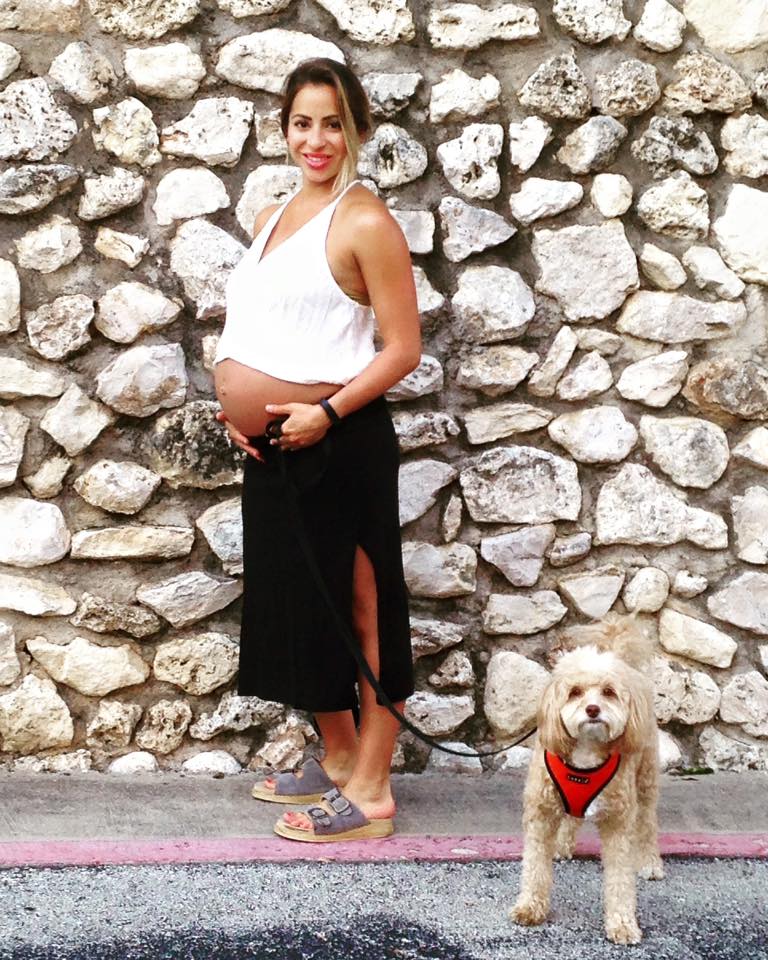
This was the last picture taken of me before I gave birth to my daughter May 2016.
One of the most frequent questions I receive these days is, “How did you manage your thyroid while pregnant?” This is a poignant question because pregnancy and post-partum is infamous for sending the thyroid awry whether or not you have Hashimoto’s disease.
my back story…
I was diagnosed with Hashimoto’s at age 19 (10 years ago) and have been on some form of thyroid hormone replacement since then. In our community, we tend towards anti-medication but in the case of many autoimmune diseases, supporting the body through medication AND dietary and lifestyle changes is a true holistic approach.
My body requires supplemental hormone because the disease has significantly destroyed my thyroid prior to diagnosis and dietary changes. Once thyroid tissue is destroyed through autoimmunity or radiation, it will not produce the necessary thyroid hormone required for optimal metabolic function. This requires supplement through medication and it is incredibly important to adhere to your doctor’s advice regarding medication while pregnant.
A quick note on which thyroid medication I take:
I am one of the rare people who has a severe autoimmune attack to porcine thyroid hormone (Armour, Naturethroid, for example). In fact, the last time I took it, I launched into a 12-month long flare that ended during pregnancy. You will also likely find autoimmune disease remission during pregnancy as the immune system down regulates to protect the body from seeing your baby as an invader.
Instead, I do best on a synthetic combination of T4 (Tirosint) and T3 (liothyronine). Yes, I’ve tried compounded medication with a functional practitioner and my numbers do not stabilize well. No, I have not tried and will not try to go off my medication. Tirosint is a great option for those of you looking for additive-free synthetic thyroid medication. Ask your insurance if they will cover it.
My story with infertility is long, and I won’t be talking about it here. Instead, let’s start with conception to keep this focused.
I went into pregnancy in the middle of that autoimmune flare mentioned above. Women with Hashimoto’s do have an increased risk of pregnancies not being carried to term (I don’t like the word “miscarriage”). As a woman with Hashimoto’s, I knew I needed to be an educated self-advocate during pregnancy and beyond.
I did not let these statistics scare me though. Sure I had my moments of worry like most moms, but I trusted and supported and loved my body extra during this time. When I needed to calm my mind, I used prayer, meditation and journaling to comfort me.
I am sharing with you the process I put into place the moment I found out I was pregnant in August 2015 to best ensure a healthy mom and a healthy baby.
GET TESTED AS SOON AS YOU TEST POSITIVE
I found out I was pregnant in Hawaii on our way from moving from Chicago to Austin. I didn’t have an OBGYN in Austin let alone a general practitioner.
The day I found out I was pregnant, I called my health insurance company from our Kauai Airbnb to get the number of a gynecology group in Austin under our plan. I knew they may not be the perfect fit, but I needed to establish care as soon as possible so I could get my thyroid tested immediately.
But what if I don’t have diagnosed Hashimoto’s? Should I still get my thyroid tested?
My answer as a thyroid patient is YES. If you have suspected Hashimoto’s or hypothyroidism or have a family history, get your thyroid tested early in the first trimester. There is absolutely no risk to you to get this done but it can be risky to NOT know what your thyroid is doing in those formative weeks.
In fact, some thyroid experts advocate thyroid testing for every pregnant woman.
The office requested I only schedule my first appointment between 8 to 10 weeks pregnant, but I had done enough research on early pregnancy and Hashimoto’s to know I needed to get in sooner.
I was able to schedule my first appointment for 6 weeks. I would have preferred 5 weeks but they did not have availability. I requested a blood thyroid panel including TSH, free T4, free T3. I even got to see my baby as a little dot on a quick ultrasound (and hear her heart beat) during that appointment.
Backing up, I had a full panel done around the time of conception and knew my TSH, T3, and T4 were normal even though my antibodies were high from the flare. Just four weeks later at 6 weeks pregnant, my TSH increased from 1.0 to 9.0 and my T3 and T4 dropped.
The increased demand on your thyroid during the first trimester is no joke. If you have a damaged thyroid due to Hashimoto’s, your thyroid may not be able to keep up with this increase demand. Test early, test often, and test fully.
Test early, test often, and test fully.
We increased my thyroid dosage by about 50% to stabilize my numbers. At this time, I was only on T4 and not T3. In fact, during pregnancy, I could not find a practitioner to prescribe me T3 since it has not been studied in pregnant women. You may have a different experience with that depending on your practitioner. I got on T3 within a few weeks of giving birth. Even without supplemental T3, I was able to keep my T3 in the 50% range and had bounds of energy throughout pregnancy.
FIND THE RIGHT PRACTITIONER
Many thyroid patients will agree that finding the right practitioner, one knowledgeable in full thyroid panels and optimal levels (not just “in range” levels) is a necessity. Pregnant women especially must feel they are in good care with their medical team. Your OBGYN, midwife or general practitioner will likely be the one in charge of monitoring your thyroid while pregnant.
You’ll likely encounter a physician who doesn’t believe in testing T3. I did several times (endocrinologists are notoriously the worst about this ironically). I essentially “fired” those physicians but not before providing information on why testing T3 is so important for their thyroid patients. This topic is worthy of more than just a quick paragraph here.
Rather than having an endocrinologist follow my thyroid throughout pregnancy, I trusted my gynecologist. We worked together to establish a plan of care that included frequent testing, monitoring of symptoms, and extra care to ensure that Grace was growing adequately. Since mothers with unmanaged Hashimoto’s can have babies with low weight as well as an increased risk of pre-term labor, we wanted to monitor closely.
How I Self-Advocate with Physicians
Whenever I move to a new city or visit a new doctor, I am very clear about a few things. I tell them I am a seasoned thyroid patient, I know how to read my lab numbers, and I know when I need a change in medication. I have lived this and researched it for a decade, and I would like to be treated that way.
The only physicians who have responded negatively to this are endocrinologists so I refuse to see them anymore. Am I being harsh about endocrinologists? It may seem that way. But over ten years, I’ve had the exact (it’s eery) same experience with over a dozen of them. It angers me to see so many thyroid patients often poorly managed by these specialists.
Being this upfront may not be easy, especially in a world where we believe medical practitioners are above us. Remember, no one knows you better. Trust yourself, your experiences and your intuition. Your doctor is your teammate not your boss.
MONITOR & ADJUST FREQUENTLY
My doctor felt most comfortable testing my thyroid every 4 to 6 weeks throughout pregnancy to ensure stabilization. I informed her at my first appointment at 6 weeks that I tend to have a volatile thyroid that struggles with stress and hormonal changes (so prevalent in pregnancy and post-partum!)
This is another instance of self-advocacy in the hierarchical medical model. Speak up for yourself. Don’t be complacent with your physician. You know your body way better than they do. They know textbooks, they know previous patients. They do not know you. Help them get to know you.
Thankfully, I only had to adjust my medicine once during pregnancy in the first trimester and was able to maintain that dosage throughout. Your doctor needs to be well-informed on the thyroid ranges for pregnant women as they do differ from non-pregnant women. For example, the TSH range is quite a bit tighter than for non-pregnant women, and it also changes slightly the first to the second trimester.
Most providers will want your TSH below 2.5 for the first trimester and below 3.0 for the second and third trimester. My TSH stayed around 2.0 throughout my pregnancy, about twice as high as when non-pregnant. I was not concerned with this number after researching the increased demand on the thyroid. It makes sense my pituitary was sending out a “produce more thyroid hormone” signal to my thyroid.
That being said, be aware of your hypothyroid symptoms even if your numbers are in range, especially if they are at the higher end of the range. For example, I could barely walk up the stairs my first trimester. This symptom (what I call “stair fatigue”) is a classic hypothyroid symptom for me. I knew I needed to give the increased dosage a couple weeks to kick in before my symptoms would reside though. Once the meds kicked in, my fatigue quickly dissipated.
It’s important to know your body in this way. Get a sense of what it feels like to be hypothyroid and to feel well. Note those hypothyroid symptoms so that if and when they appear, you can get yourself to your doctor for testing.
SUPPORT YOUR THYROID WITH DIET & LIFESTYLE
I started the autoimmune protocol in 2014, about 18 months before getting pregnant. In fact, it was key in helping me reverse my infertility diagnosis. I didn’t use pregnancy as an excuse to go wild on cravings though. If there’s ever a time in your life to treat your body with respect, it’s during pregnancy and post-partum.
The nutritional and energy demands of a woman’s body during this time are astounding. I made a pact with myself to stick as closely to the principles of the autoimmune protocol as possible during pregnancy and post-partum. Note that I said the principles of the protocol and not the elimination phase of the protocol.
For me, this meant including foods I knew I tolerated well such as soaked organic white rice cooked in broth, dark chocolate, seed spices and treats like store-bought coconut milk ice cream. This allowed me to focus on nutrient density while still having fun with food and listening to my body.
I would be lying if I said I ate “perfectly healthy” my entire pregnancy. I am not a diet perfectionist by any means. My food choices stem from my intuition, my mood, the social setting and frankly what’s in my fridge. While I ate dark chocolate most days, I also never skipped a meal. I had three balanced meals each day that included protein (a must!), leafy greens (folate!), starchy veggies (glucose!) and fats like avocado or coconut. I wish I still ate like that post-partum!
I personally do not believe in attempting low carb and ketogenic diets during pregnancy. I only mention this because they are trending hard right now. I am so happy for all the people these diets heal and bring happiness. If you naturally eat low carb (and you’re being honest with yourself about it being natural), then continue to listen to your body.
But if you are truly craving sweet potatoes, dried mango or a bowl of freakin’ cereal, then YOU get to decide if you eat that or not. Not a diet guru. In fact, I had gluten-free cereal several times during pregnancy. I also distinctly recall eating a bowl of rice with coconut aminos at 3 am because I woke up craving it and was starving (2nd trimester hungry, if you know what I mean).
My pregnant body craved SPECIFIC foods like citrus, mango, berries and sweet potatoes. And I don’t blame this on being a “sugar-burner” (so many opinions on that terminology, by the way). These are common food cravings for pregnant women for good reason – our bodies demand all of that folate, vitamin C and glucose they’re asking for. WE’RE BUILDING A HUMAN. Be easy on yourself but also treat your body with respect and let that be reflected on your plate, with your sleep, your stress management, your movement and your relationships.
It is my goal one day to provide a more inclusive guide of managing autoimmune disease during pregnancy. Until then, I hope this article provided you with some helpful, actionable information to protect your thyroid health during pregnancy.
ADDITIONAL RESOURCES
Hypothyroid Mom is an excellent resource for additional information on fertility and pregnancy. Dana Trentini is also the author of Your Healthy Pregnancy with Thyroid Disease. You can also order your own full thyroid panel with a coupon code on her website.
Looking for post-partum support? I found Dr. Jolene Brighten’s book Healing the Body Naturally After Childbirth helpful.
I also have written an article on Balancing Hormones for Fertility. You can read more about my story of reversing infertility here.
Disclaimer: I am not a medical practitioner, and I will not be able to answer specific questions regarding your health state. I am here for emotional support and to provide hope. The information in this article is based on my personal experience and research.









70 Responses
Thanks for the great information! As someone who has struggled with getting my Hashimotos under control for years, I am worried about what will happen once we start trying to have a baby. One aspect that has made it difficult is finding the right practitioner to help me. Do you have an recommendations for doctors in the Chicago land area (General practitioners, thyroid specialists and/or OBGYNs) that you know of or have worked with to address Hashimotos?
Thank you for any help you can give me!
Hello Britt, I would check out the Institute of Functional Medicine website at IFM.org – they have a list of practitioners that should be able to help you! I wish you the best of luck on your journey <3
Did you ever find any docs that you like? I am in same boat in Chicago! Thx for any advice!!
Thanks for the article, I have a question about the antibodies, have you check on them during pregnancy, and do they have any influence on the baby?
I did not have them checked during pregnancy but right before and right after they went from super elevated to 0 during pregnancy.
Hi, I’m so glad I found your post as it’s super helpful to hear from someone else’s successful experience with fertility and Hashimotos. I’m curious what your TPO antibodies were at when you say sky high. Mine are >600. Was your TPO that high? My integrative doc has encouraged me to wait to fix my adrenals, slight high cortisol, before even getting on T4 to bring the TSH down.
Mine were about 300
What are the current recommendations regarding treating Hashimoto’s during pregnancy?
T4 only and to keep your TSH at the numbers indicated in the article. Very bare bones.
Are you recommending those who are on NDT to switch to T4 only, or are you speaking for the synthetic thyroid med contingency?
Can you steer me to any post partum articles – i think i remember you mentioning a flare.
I’m 40, had my first at 37 / was diagnosed 5 wks later, and only bc I bc deathly ill after a bad Cipro reaction 4 days pp. (Given Cipro by on call dr for suspected uti which was actually just catheter pain).
It took me almost this whole time to get back to feeling good and I’ve even gone thru a blood panel induced cancer scare. My wbc tends to go low, as well as my neutrophils. That said, I realllllly want to be pregnant again but I fear getting so sick I can’t take c/o my children.
I also fear heart, kidney and cns birth defects that can come w treated thyroid disease. My first had two thumbs on her left hand (can be from thyroid!), has a small hole in her heart, small hernia above her navel, a spine anomaly – maybe a very mild spina biffida occulta, a lip tie, and you can see the seam where her upper lip came together. She was born 9 lbs 8oz but w low blood sugar and jaundice. This said, I was not treated at the time, and I also took New Chapter (folic acid) but now know about my homozygous mthfr status.
I know only I can make the decision, but fear clouds my judgment. I guess I fear that even though I am feeling way better, I’ve already damaged my body (esp fr cipro) and I’m 40. Any advice? I’m also in ATX and would love dr recs!
Thabk you for blogging about your experience, and sharing the deliciousness that can be the AIP adventure!
Hi Sara! I can understand your fear as a thyroid patient, but if your disease is managed the risk of birth defects is greatly reduced. I’m not recommending for anyone to change their medication. I am not a doctor, and you need to talk to your doctor about that. I have a disclosure stating that & this is my personal experience. Not everyone will have an autoimmune reaction to NDT, but I do and it makes my disease incredibly worse. I went to Wiseman Family Practice when I lived in Austin but no longer live there – they take insurance but there are plenty of functional doctors in Austin who can give you more customized care out of pocket if your budget allows it! I’m sending you all the love & well wishes as you continue your healing journey.
I’m on t3 only, I do not do well with t4, I convert it into reverse t3 and feel horrible. I’m pretty sure I can be on t3 whike pregnant. There are people taking naturethroid/armour while pregnant and those contains t3. What were your TPO antibodies at while pregnant?
Yes I have no doubt T3 is fine when you’re pregnant but doctors (both functional and conventional in my experience) give me the “T3 doesn’t cross the placenta” excuse. I actually can’t be on T3 because even the lowest dose shoots me up into an elevated range. I’m the same with too much T4 as you (converting to reverse T3) but fine when it’s at the proper dosage. My antibodies were 200 when I conceived and dropped to 0 in the second trimester.
Thank you for the info. I had my thyroid checked during breastfeeding my last baby and only my antibodies came back elevated. Went to see an endocrinologist that was not helpful. I am now pregnant again and just had all my numbers rechecked. Not sure what the results are but have a lot of Hashimotos symptoms. I live in Austin and am wondering if my numbers do come back elevated what doctor to go to. Do you have any recommendations? Thanks!
In Austin, I saw Wiseman Family Practice who takes insurance. They aren’t a functional medicine office but they are integrative. They would be able to help you with medication if needed and proper testing.
Hi Aleana-
So happy to have found your site. Thank you for sharing your story and all of this useful information. My husband and I have lost three pregnancies over the past three years. For the past two years, I have been on a mission to determine the cause which has included researching and firing doctors, diet and life style changes, job changes, you name it. I finally found a doctor who would run the full thyroid panel I was asking for and it was determined that I have Hashimoto’s. I have had the same frustrations with endocrinologists that you write about. It’s horrible. I was curious to know if you and your doctor’s monitored antibodies (TPO in particular) while you were pregnant? I am hoping we will become pregnant again but before we do, am wanting to make sure I have a team of doctors who will support me to help manage the fear. Thank you again.
Hi Amelia, Congratulations on making so many successful strides towards your health and fertility. I had my antibodies monitored two weeks before conceiving and 4 weeks post-partum (and every 3 months since then). My antibodies dropped to 0 while pregnant – I knew this based on how great I felt during pregnancy. My thyroglobulin antibodies remain at 0 16 months post-partum and my TPO are slightly elevated but I’ve never been able to get them down to 0 except during pregnancy. It’s most important to monitor your TSH, T4 + T3 during pregnancy than antibodies since those can be more quickly managed with medication than antibodies.
Thank you for the response. I asked about antibodies (TPO) because of the correlation between elevated antibodies and recurrent pregnancy loss, which has been my challenge. Did they ever test you for what they call “natural killer cells.” Awful name, but another factor that they consider in women with autoimmune conditions and recurrent pregnancy loss. Thank you again for sharing your journey.
No – I do not have a history of miscarriage so we were not concerned, but if I had, I would have explored further testing.
Hello. Do you have to be gluten free with hashimotos? Thank you!
It’s greatly supported in both research and anecdotally that gluten is significantly related to Hashimoto’s as a cause and can also worsen the disease. If you’re unable to manage Hashimoto’s and eating gluten, I would consider removing it from your diet. I have been gluten free for 6 years, and it has not impacted my happiness in anyway, it has only helped.
Great blog!! I have struggled with hashimoto’s and celiac disease for 16 years and am 25 weeks pregnant. I just wanted to commend you for being so spot-on with both severe autoimmune requiring medications (thank goodness Tirosint came along- they wanted to remove my thyroid bc meds stopped working) and how AWFUL endocrinologists are. I have “fired” so many in my time and I find that I am better off utilizing my OB/GYN for monitoring. I am so surprised by how incompetent and out dated most endocrinologists are. I am a Nurse Anesthetist by trade and fear for non-medical people. I am educated to know their incompetence, but what about all of the people who just “trust their doctor?!” It is completely unfair to them. That is why bloggers, such as yourself, are so needed in this world.
I’m so passionate about this topic as well. It angers me to my core & I’ve had some choice words with many endocrinologists. I do not recommend thyroid patients manage their disease through an endocrinologist unless he/she is coming from a functional background and willing to run a full thyroid panel and based prescribing medications on patient subjectives and not solely lab work. My functional GP manages my thyroid post-partum now.
Hi,
I am in Austin as well and was wondering which office you go to? I currently go to Wiseman as well. The person I see is ok, but the doctor you worked with seems more experienced with Hashimoto’s. I just found out I am pregnant and would like to see someone that can lead me in the right direction for this pregnancy. Thanks!
I no longer live there, I’m sorry!
Hi Alaena
Thank you for sharing. However can i ask if you can share what happens to baby? I have had Hashimoto thyroid for 7 years and i just gave birth to a daughter 2017. During pregnancy i managed to do my blood testing and baby is fine. Exvept i am told to do blood test for baby yearly till 5 years old. Yesterday marked her first birthday and the results came back with TSH slightly higher than normal. 🙁 just want to hear more stories of babies born with mom with Hashimoto. Please share any is highly appreciated.
Many thanks
Chanthy
Hi Chanthy, I haven’t ever come across information indicating it’s the norm to monitor a child’s thyroid unless indicated by symptoms. Our pregnancies and thyroid disease were different, so I don’t have any words of advice on this topic other than my daughter is healthy at this point at almost 2 years old. Sending you & your daughter love!
Thank you so much for sharing all of this! I just read this post and I can not wait to explore this site. I was recently diagnosed with Hashimoto’s and in the process of determining rosacea vs. lupus. My mom has lupus and several other related/associated disorders. As I start my research (I agree we are our own best advocates!) I’m finding that autoimmune conditions can be complicated and overwhelming. I am eager to find practitioners who take an integrative and holistic approach. Thanks again for sharing all of this info. I think you’re having a much bigger (and positive) impact that you even know. Thanks a million.
Thank you for sharing your story, Kristen. Autoimmune disease is so complicated and there’s no one right way to go about healing, but I hope sharing my experiences leads at least one person down their right road <3
Hi Alaena!
Thanks for sharing your experiences! I was recently diagnosed with Hashimoto’s last August 2017, after years of thyroid levels being unstable. I was put on synthroid, and responded really well to it, and really quickly! I was first on 75 mcg, then 88, and for the past few months, my TSH has been great and stable at a .45. A few weeks ago however, I learned that I am pregnant!! My husband and I are SO happy and SO excited, and I really was not concerned about my TSH levels because they were responding so well to the 88 mcg and were stable at .45. I am about 7 and a half weeks pregnant (so still pretty early), and so I know that I am now going to need to get my blood work done every 4 weeks–my doctor and I have a solid plan about this. I got blood work done three days ago. HOWEVER….this morning I got a phone call that my blood work came back, and my TSH is now at a 10.25?!?! I am still just SHOCKED that it spiked so much in literally just a few weeks. I guess it really is from the pregnancy hormones? But going from a .45 to 10.25 just seems so drastic to me….its very scary. My doctor is upping my synthroid to 125 mcg, and so hopefully that helps, and helps quickly. I know the first trimester is crucial to baby’s health!
Just wanting to get some words of encouragement from someone who has been through a similar experience. I know you said your TSH spiked to a 9 at the beginning of pregnancy….I am just so worried about miscarriages, still birth, neurological issues…all the risks you hear about when it comes to Hashimoto’s and pregnancy 🙁
Thanks for any words of wisdom you can provide!!
Hi Sarah – just seeing this in October – how did everything turn out? I have a similar situation.
Hello, Sarah and Kelly, I am having a similar situation as well. How did everything go for you?
Hello!
I have hyperthyroid (seen in an uptake and scan) but my TSH is usually in the 2.8-3.8 range. Thyroid problems are so mysterious! I’ve been in AIP with a few reintroductions for 2 years. I feel great and seem to have my symptoms under control. They were CRAZy before AIP. My endocrinologist almost poinsined me with my meds and made my TSH go up to 103.4. I found a funational doc in Tampa who is awesome. I am not on meds right now. I am hoping to try for my second baby soon. Do you know what prenatal vitamins are “clean” for AIP? There’s so many choices out there but also some with yucky ingredients.
I really like Nutrience’s vitamins – they are not “prenatals” though but they are absorbable and have a non-compete technology so that your vitamins and minerals aren’t “canceling” each other out. Thorne is another one I know others are a big fan of – I just never get great absorption with tablet/capsule vitamins myself.
Hi Alaena,
I recently figured out my antibodies were raised due to naturethroid, tried Armor and they went up to 800 :(. My RT3 was also very high so I’m on cytomegalovirus right now, but I’m wondering if you know if there is a reason for the autoimmune response to the “natural” hormones? Like what about them triggers it and synthetic doesn’t? I’m just curious, I’m glad I finally figured it out but wondering what the heck was happening. If you don’t know then you don’t, just thought I’d ask! It can be very hard finding answers, as you know.
Thank you!
Hi Alaena
Thanks for sharing the story
I am 3 weeks pregnant and found out few days ago that my TSH is 6.74.
I was treated for hyperthyriod and put on medoctaion to control before preganancy. Around 3 weeks before the conception my tsh was at correct 0.6. My medications was adjusted and right now my tsh dropped to 3.5 and hopefully will continue to drop. So theoretically it will go back to range withing this week. I am just super worried for the effect of increased tsh in this initial 3 weeks of preganancy. Whould this have affected my baby brain development and delayed the gross motor skills. I found out in reserch that if tsh is high in first trimester this is the risk. Whould you have any recommendations or maybe extra info from your experience. Many thanks .
Please please – I am a long term hashi’s patient who has tried all thyroid medications and the only thing that works for me is levoxyl and t3. I am 16 and half weeks pregnant after having hormonal imbalances for 13 years with no natural cycle and then switching to AIP and dietary changes to heal my gut (and obviously my hormones healed too!)
The endocrinologist I met begining of pregnancy took my off t3 bc she said research suggests it doesn’t cross the placenta – I am feeling horrible and tired.
Did you take t3 throughout pregnancy?
Hi Sara! I actually am unable to take T3 because I don’t have conversion issues anymore, so I can overdose on it really easily and become hyperthyroid. I could not find a physician to prescribe T3 during pregnancy but a functional medicine doctor may be more comfortable doing so. It’s always hard to tell if you’re feeling tired from all the changes in your body or your thyroid – I suggest getting your blookwork done and aiming for a minimum of the 50% for your free T4 and T3. Your TSH will naturally be higher during pregnancy even if on medication but as long as it’s within the limits recommended by AAP, they may keep your meds the same.
Hi – I have Polymyositis and am considering pregnancy but very afraid at the same time. How did your body handle post-partum? Did you have any flare ups? There is so little research on Polymyositis and pregnancy but the high risk OB I consulted with gave me a lot of info… a lot of it scary. I am currently on AIP too.
Hi Alaina,
Thank you very much for sharing your story. It would be highly motivating for pregnant women with Hashis. Could you please let me know if you had taken TDAP during pregnancy (which week) or you took it right after birth. Was there any side effect?
That is such an individual choice but as a vaccine injured individual – and the fact it hasn’t been tested in pregnant women – I personally decline the vaccine and use preventative measured with my newborn to ensure she is safe. It takes some extra precautions and limiting of guests who visit.
Hey there. Thanks for the great post. I have Hashimotos and am currently 37 weeks pregnant. My tsh has been under 2 my whole pregnancy and I take Synthroid. My tpo antibodies have dropped from 250 to 50 during the course of the pregnancy. Now as the pregnancy is ending, I am concerned about having a flare up after giving birth. Did you have any flare ups post partum? Any advise on how to handle it or lower the chance of it happening ( I know this is just from your personal experience). Thanks !
I did have a small flare between months 3 to 6 post-partum but supporting my body with nutrients and as much rest as possible helped me avoid anything longer! Congratulations on your pregnancy and your new little love!
I just wanted to thank you for this article. I also want to let your readers know of a world class endocrinologist (yes, it’s true!) in the Houston area. His name is Dr. Orzeck and he manages my thyroid in what is currently my 2nd pregnancy. Both of my babies are products of IVF (due to severe endometriosis) and the world class dr who was able to salvage my lady parts recommended Dr. Orzeck.
I am so thankful to read this article because as I am currently in my 2nd trimester, it is a perfect mirror of the pregnancy you have described here. After not even having cycles due to thyroid, we were able to stabilize the thyroid so that I could get pregnant. Having a managed thyroid during this pregnancy vs my first makes all the difference in the world. I am not bound to bed rest, I am no longer on progesterone injections (my body is making its own!) and this go round I’m much less fearful of preterm labor (went into it at 30weeks with my first). Thank you for your information and your encouragement to be your own advocate, because you are absolutely correct. It is a fight, and when you are pregnant especially, it is worth all your efforts.
Hi I am so happy I found your post. I suffer from hashimoto’s thyroiditis. I am currently on 75mcg of levothyroxine. I completely agree with you when you say endocrinologists are not helpful it is truly sad. I really have no relief of my symptoms and have yet to find someone who takes me serious. All the doctors I see pretty much treat my levels and not my symptoms I am constantly fatigued and always sick. On top of it I may have ibd or rheumatoid arthritis and possible cardiovascular problems. I am around 14 weeks pregnant. I had a miscarriage two children after that miscarriage and then have had two more miscarriages in the past few months and now I am pregnant and while the baby is doing well thank God, I am not. Do you know of anyone in Ohio area who is good with thyroid problems? I would appreciate any suggestions or information you may have. Thank you so much for your time.
Hi Julie. Congratulations on your pregnancy and I’m so sorry about your pregnancy losses. Have you checked out the IFM.org website to find a functional medicine practitioner in your area?
Aww, I loved this post! So sweet. Makes me want to have a baby all over again
Hi ! What prenatal vitamin would you recommend?
Hi Toni! It depends on your individual needs but Seeking Health’s Optimal Prenatal is a good place to start. You may want to find a gummy prenatal if you have bad morning sickness the first trimester. Smarty Pants has the proper form of methylated folate in their prenatal gummies!
Seeking health has soy in them! ?
When taking Thorne basics did you take a separate choline supplement due to it not having choline in it?
Hi there! I have had Hashimoto’s since I was a teenager and now at 29 I have a healthy, happy 22 month old baby girl! It was definitely difficult at first finding practitioners who would listen to me about my concerns immediately after discovering I was pregnant. I had one Dr. Tell me that I didn’t need to monitor my Tsh at all during pregnancy! Anyway, after breastfeeding for 12 months, I have been on a roller coaster regarding my Tsh the last 10 months or so. Have you ever heard any this? I can not seem to get regulated or feeling better for very long periods at all. My disease was so easily managed all those other years and now I feel like I’m going crazy!
Hi Britney, I’m so sorry to hear you’re having a hard time managing your thyroid. I recommend working with a functional medicine practitioner who understands the thyroid’s intricacies as well as how it connects to the pituitary, adrenals and sex hormones. I never had to change my medication dose until becoming pregnant with my first – if you’re not getting your medication adjusted and tested frequently that is probably the first time as well as ensuring you’re on a gluten-free diet (possibly dairy-free, soy-free and nightshade-free too if you haven’t done an autoimmune elimination diet before).
I really enjoyed your article. There aren’t a lot of stories of hashimotos and pregnancy on the web. That was super encouraging to me. I’m currently 17 weeks pregnant and only known I have hashimotos for 7 months now. So figuring out that and then getting pregnant and figuring out the changes has been a challenge. So very helpful for me going forward to best care for me and baby. I’ve also heard not great things about the struggle with endocrinologist or even a regular phycian not doing the right tests. I went to a natropath, and she went straight into change your diet and you need medication to get your numbers down and even out. Then we’ll see if we can get you to where your body can go without medication and we can manage it with just diet and lifestyle, because that would be ideal for your Tyroid.
Wow! Sounds like your naturopath needs to be training the endos! This is OFTEN the case with conventional medicine unfortunately – I hope that one day the majority of the Hashimoto’s population will be treated through a holistic lens versus conventional medicine standards which often make us more sick or in the very least do not allow for improvement. Sending love xo
Hi thank you for your article. I wanted to share my story for those who have recurrent losses. I have 2 children and we were trying for a third. After 2 years of trying and not getting pregnant I was diagnosed with hashimoto’s with antibodies over 1500 but my tsh was within range. I did not have hashimotos with my first 2 kids.
I went gluten free and worked with my naturalpath (bc endocrinologist wouldn’t work with me bc my tsh was within range).
I got my antibodies down to 600-700 range and I fell pregnant 4 times, all early losses. I am now pregnant a 5th time but this time I started progestrone and 25mg of synthroid at 10 dpo. So far so good.
What I did to bring my antibodies down was go gluten free, and tons of various vitamins from my naturalpath (t-cell balance, selenium, inositol, and a few others). I was having crazy flare ups before I got my antibodies down. Good luck to everyone who had to manage this disease eith little help fron the medical community. You don’t know how many times I’ve been told, I can’t do anything about hashimotos (euthyroid) and they cant help me until my thyroid is no longer functioning on its own.
Thank you so much for sharing this! This is a similar story to so many other women with Hashimoto’s. More often than not we need to approach this bodily imbalance from a holistic perspective. Sending you and your baby so much love!
Awesome page ! We are starting to try now and i have Hashimoto’s. I am very concerned about this since it actually started to cause issues with my pituitary. While we got that under control my anti bodies are a little elevated. My Primary who i love told me not to worry. everything i have read online has made me so discouraged. I am happy to see you were able to have a successful pregnancy,
sending you lots of love <3
Hi there, I actually live in Austin and my endocrinologist just stopped taking my insurance. If you liked your endo here in Austin, would you share who you went to. I’ve been referred to a reproductive endocrinologist since we’re having trouble conceiving and my antibodies are high right now. I would love one that comes recommended. This is all new territory as I have Hashimoto’s but had no problems conceiving our first five years ago. I’m sure my age is probably part of the problem as well!
Thank you for this article! I have been diagnosed with Hashimoto’s since 2009. Thankfully, I have a great primary who does a full thyroid panel, and recognized the members before the Hashimoto’s did any real damage to my thyroid! My husband and I are currently trying (for about 6 months now). I have a question more about diet. I did AIP full elimination last Janiary (2019), lost a bunch of weight, and felt great! But never added things back into my diet like I was supposed to. Then my mom got sick (pancreatic cancer) and passed away in Dec. It was a year of high stress, and I ended up putting the weight back on and then some. I cut myself some slack, and decided I needed to take control of my health once again. It has been a roller coaster, but I’m definitely getting back to where I need to be (mentally and slowly physically). I know what to what and not eat on elimination and have actually added some things back in without issues. Should I just trust and listen to my body when it comes to food and being pregnant? Not fully following the program of adding things back into my diet makes me a little worried I won’t be eating the correct things for my body to promote healthy baby! On a side note, I think there is a nutritionist who works with my obgyn. Thank you for posting this, as most of us have to do this research on our own!!
Thank you SO MUCH for this article!
My TSH has been up and down the last 15 years from being within the norm to going up as high as 7. All these times my T3 and T4 have been within norms (though granted on the lower end). Only things that I could pin point for it being under control were less stress and gluten free. I am now gluten free since 3 years and so many things besides the thyroid have improved (better skin, less period pains etc).
I have been told by endocrinologists I have seen that I have subclinical hypothyroidism, others said Hashimoto. I havent had good experiences with them and dont like them as everyone I have seen only treats according to norms and averages without getting into your history. It is so angering and disappointing! And scary….!
I want to conceive and I am terrified what it means for me with my TSH problems. I have not found any doctor out there who inspires confidence and that’s really blocking me from starting a family. This article was the first that told exactly what I was looking for! THANK YOU!
If anybody would please share any comments about how they felt during their pregnancy with hypothyroidism, any severe symptoms e.g. very high weight gain that they couldnt loose after pregnancy I would be forever thankful!!
Evelyn – not sure if you will see this message but you are welcome to email me at alaena@grazedandenthused.com I’m happy to help!
It was perfect timing for me to see this in your newsletter! I am 6 weeks pregnant and was a little stressed about my Hashimoto’s and pregnancy, but this was soooo reassuring! Just had my thyroid numbers checked and they jumped up a bit from before pregnancy, but my doctor is happy with the numbers and how I’m feeling! Listening to my body is going to be a priority. Thanks for writing this post!
Congratulations on your pregnancy, Sarah! I’m happy to hear this article provided some reassurance during this time <3
Would you please let me know if you have any resources for postpartum? I’m currently 31 weeks and trying to make intentions for treatment once I give birth. So far my numbers have been in range throughout pregnancy but I’m nervous when that progesterone takes a nose dive and estrogen sky rockets post birth.
How to proceed?
Dana Trentini has a book that may be helpful for pregnancy and post-partum with Hashimoto’s and make sure you get tested within a few weeks after birth and every couple months after that until levels stabilize
I just found this article while researching Tirosint as it was just prescribed to me since synthroid doesn’t appear to be fully working. I just wanted to say that I’m so grateful for your post! Your journey reflects mine, except I used to have Graves and then I was euthyroid for a while, but I am now 18 weeks pregnant and was diagnosed with Hashimotos at 8 weeks. I just wanted to thank you for your post, it is great to know I’m not alone!